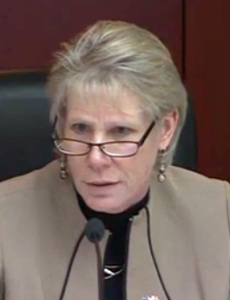
Anyone who pays attention to the job market these days realizes this country is deficient in Science, Technology, Engineering and Math (STEM) expertise. We have to import qualified immigrants from other countries to fill these vital roles in our industry, because our education system has failed most students in this area of study. Even a US graduate of a science curriculum as rigorous, as, say, microbiology, seems to lack the analytical skills one would expect of your average grade school student. In recent decades there’s been an increasing underlying tendency to think emotionally instead of analytically. There’s no other explanation for the huge popularity of Bernie Sanders with young folks who cannot understand how ‘free college’ actually works.
In the April 19 Clark County Council hearing, after comments by Mr. Christian Berrigan, counselor Julie Olson had the following to say (1:44:50):
Mr. Chair? From July 2014 to August 2015 the county spent, when the Reflector was the paper of record, $122,492, because we had to also use the Columbian and other papers to get our legal notices out. When the Columbian was the paper of record and ‘13-’14, the county spent about $77,000, so the numbers are the numbers, circulation is circulation, we can go back and forth about this as long as you want, if you got something else you want to say…

David Madore attempted to address some of the misinformation by Counselor Olson, but was denied the opportunity by Chairman Boldt, in clear violation of his role to equally apply the rules. Chairman Boldt’s high-handed denial of Counselor Madore’s right to address the board again demonstrates his inability to hear and process opposing opinions and his need to use high-handed tactics to silence these opposing views.
The record clearly shows that the Reflector is the cheaper of the two major papers in Clark County, at $1.02 per line for the first insertion and $0.84 for subsequent insertions is cheaper than The Columbian, which charges $1.77/$1.45.
Here’s where we get into how to think analytically. Take the following word problem you might have been confronted with in fifth grade:
Julie buys eggs on Monday from Ralph, and spent $12.20. On Tuesday she bought eggs from Charles and spent $7.65. Who has the more expensive eggs, Ralph or Charles?
I’m sure everyone has seen this sort of nonsensical story problem in their education careers, and watched as math teachers squirmed uncomfortably to justify them when their A students challenged them on the premise. The smart teachers acknowledged that it’s a bogus question and just threw it out. The C students and those bound for liberal arts degrees (and microbiology, apparently) would happily respond with “Ralph! Ralph’s eggs are more expensive!”
No, children. It’s a bogus question, because nowhere does it say how many eggs were bought by Julie each day. There is no answer, because you don’t have enough information.
Unless of course, the answer suits your purpose, to reward Charles with the egg contract for the next year because he helped you get into the position as head egg-buyer.
How about a question that actually has a connection with reality?
Julie buys eggs on Monday from Ralph, whose eggs cost $0.10 apiece, and spent $12.20. On Tuesday she bought eggs from Charles, whose eggs cost $0.17 apiece, and spent $7.65. Who has the more expensive eggs, Ralph or Charles? How many eggs did Julie buy each day?
Now this is an answerable problem, and give the student a better idea of who should get the long-term egg contract. Even Purchasing Manager Michael Westerman, in his public testimony when presenting the bid, was honest enough to admit that you cannot compare one year to another like this without taking into account the volume of business transacted.
Councilor Olson tried to make the claim that it cost more to advertise in the Reflector, because for special items they also had to advertise in the Columbian anyway. Apparently Councilor Olson doesn’t understand that if that’s really a concern, then the reciprocal is also true, that there must be just as many times you would want to advertise in the Reflector and other papers instead of just the Columbian. Or is it Counselor Olson’s contention that recipients of the Reflector are not as important as citizens as subscribers to the Columbian? Councilor Madore correctly pointed out in previous hearings that you cannot base planning and budget decisions on exceptions to normal operations.
Does Councilor Olson really lack the analytic ability to understand how illogical her position is, or is she smarter than a fifth grader and is just lamely trying to obfuscate the issue to justify her rewarding her friends at the Columbian with an illegal contract?
Well, even a fifth grader can figure all of this out—and so can councilor Julie Olson. This is simple corruption, as councilors Julie Olson, Marc Boldt, and Jeanne Stewart pay off the Columbian for future favorable coverage and other mutual benefits that come with such a relationship. Of course the citizen’s well-being and tax dollars aren’t considered by these three self-serving and special-interest driven politicians.
